

Ziauddin Yousafzai: My daughter, Malala. Dare to educate Afghan girls - Shabana Basij-Rasikh. Why aren't we only using solar power? - Alexandros George Charalambides. This TED-Ed Select takes a look at sustainable energy and what we use our energy for.
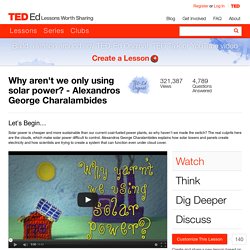
The Cloud Appreciation Society Despite the major progress in the use of solar energy during the past years, and the large scale installations mainly of Photovoltaics (PVs) and to a lesser extent of Solar Thermal Power Plants, Solar Renewable Energy Systems (RES) have not yet achieved high penetration in the energy sector compared to the existing fossil fuel power plants.
This is mainly due to their dependency on the variability of the sun’s irradiance and in most cases, due to the lack of affordable storage options which leads to the attenuation of the power output of the solar RES. This dependency is more profound during partial cloudy conditions, when the fluctuations of solar irradiance over the solar field of the PV Park, due to the presence of the clouds in front of the sun disk, result in the attenuation of the power output of the system. Don't speak the lingo? Fresh water scarcity: An introduction to the problem - Christiana Z. Peppard. Christiana Z.
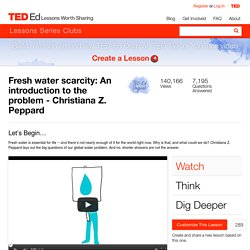
Peppard is a water-loving biologist turned ethicist who thinks a lot about bodies of water and the fact/value distinction. She is Assistant Professor of Theology, Science and Ethics at Fordham University in New York City.A video about how to conserve water: is part one of two in a series about water: Fresh water accounts for only 2.5% of Earth's water, yet it is vital for human civilization. What are our sources of fresh water? In the first of a two part series on fresh water, Christiana Z. Do the green thing - Andy Hobsbawm. EDJ.pdf. Greening the ghetto - Majora Carter. Majora Carter argues that “race and class are extremely reliable indicators as to where one might find the good stuff [in a community], like parks and trees, and where one might find the bad stuff, like power plants and waste facilities.”
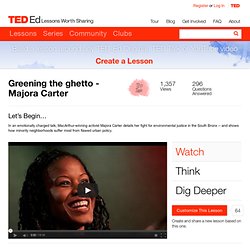
Create a list of what could be considered the ‘bad stuff’ in a community, and identify where these things are located in your own area. Do you think this bears out Carter’s claim? Learn more about Majora Carter. How did she become an environmental justice advocate? Want to be an activist? Start with your toys - McKenna Pope. Jeremy Gilley: One day of peace. Katherine Fulton: You are the future of philanthropy. Bandi Mbubi: Demand a fair trade cell phone.
Peter Singer: The why and how of effective altruism. Boyd Varty: What I learned from Nelson Mandela. Ron Finley: A guerilla gardener in South Central LA. TED under 20. Thomas Suarez: A 12-year-old app developer. Two young scientists break down plastics with bacteria. Taylor Wilson: My radical plan for small nuclear fission reactors. Toby Shapshak: You don't need an app for that. Emily Pilloton: Teaching design for change. Michael McDaniel: Cheap, effective shelter for disaster relief. Tristram Stuart: The global food waste scandal. Richard Turere: My invention that made peace with lions. Natalie Warne: Being young and making an impact. Tavi Gevinson: A teen just trying to figure it out. Humans of New York. The nurdles’ quest for ocean domination - Kim Preshoff. Captain Charles Moore was the first to discover a large collection of plastics circulating in the Pacific Ocean.
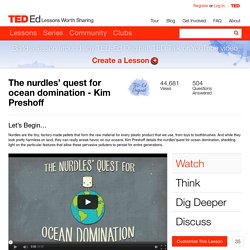
Take a look at this TED-Ed lesson Seas of Plastic: Captain Charles Moore to learn more about his discovery of the Great Pacific Garbage Patch. Where do the nurdles and microplastic floating in the ocean go? Often, they are deposited on the beaches of islands near the circulating ocean gyres. Midway, an island in the Pacific, is home to a large albatross population that is currently suffering from the plastic pollution floating in our oceans. Teens Making a Difference. Loukoumi. Organizations with Volunteer Programs for Kids - GreatNonprofits' Blog. Organizations with Volunteer Programs for Kids July 2, 2014 at 12:56pm.
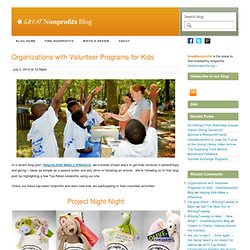
Kids who make a difference. Search Results kids making a difference. Top 11 Kids Who Made A Difference In 2011. VolunteerMatch - Where Volunteering Begins. Largest organization for teens and social cause. Volunteer, work, intern, organize, hire and connect. Change the world - idealist.org. Kids are Heroes - Kids are making a difference in this world. 65 Ways to Make a Difference. KidsCanMakeADifference.org - What Kids Can Do. Kids Who Are Making a Difference. Jack Andraka: A promising test for pancreatic cancer ... from a teenager. Kids Who Make a Difference - Kids Making a Difference. Racing Against Cancer Winter Vinecki Age 12, Salem, OR Everybody in Winter’s family likes to race, so it’s no surprise that by age 8, she’d run a 10K.
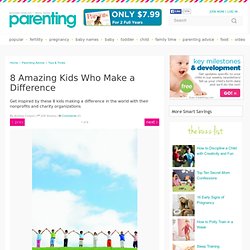
More eye-opening: She raised $1,100 in donations for cancer research. Halfsies. Halfsies addresses 3 major issues: 1) Oversized Meal Portions 2) Excessive Food Waste 3) Local and Global Hunger These problems are not unrelated.
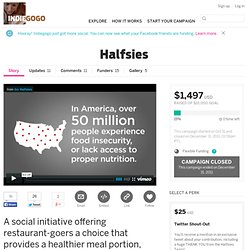
Anil Gupta: India's hidden hotbeds of invention. Lauren Hodge, Shree Bose + Naomi Shah: Award-winning teenage science in action. Inventions that Shape History Series. What Will You Do with Your Life? Series. Ingenuity in the Developing World Series. A global culture to fight extremism - Maajid Nawaz. Learn more about Khudi, the grassroots movement Nawaz started in Pakistan: What messages is Khudi trying to spread, and how are Nawaz and his colleagues doing this?
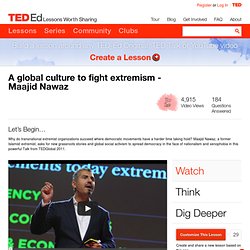
Nawaz says that social movements are fueled by ideas, stories, symbols, and leaders. Research a modern-day social movement and identify its ideas, stories, symbols, and leaders. Do the same for the opposing movement/view, if one exists. Create an infographic that provides an overview of each. Quilliam Foundation. A warm embrace that saves lives - Jane Chen. Welcome to Forbes. Plastic Bank: Harvesting Waste Plastic to Reduce Poverty Through 3D Re-purpose Center for Social Plastic & Ocean Bound Plastic. Kid President. Your donation will help meet the needs of children and families in local and global communities and empower youth to make a difference. Kids Can. Kids Can...
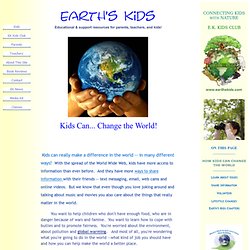
Change the World! Kids can really make a difference in the world -- in many different ways! With the spread of the World Wide Web, kids have more access to information than ever before. And they have more ways to share information with their friends -- text messaging, email, web cams and online videos. But we know that even though you love joking around and talking about music and movies you also care about the things that really matter in the world. You want to help children who don't have enough food, who are in danger because of wars and famine.
25 Free Apps That Are Making The World A Better Place. 10 Simple Ways to Make the World a Better Place. “As one person I cannot change the world, but I can change the world of one person.”
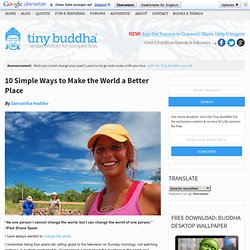
~Paul Shane Spear I have always wanted to change the world. I remember being four years old, sitting glued to the television on Sunday mornings, not watching cartoons, but utterly captivated by World Vision. I cried about the injustices in the world, and begged my mother to let me sponsor Maria, the girl with the large, sad eyes who was around my age. Kindness Ideas. Loading 350 Kindness Ideas... Donate! Do some early spring cleaning today and fill some boxes with gently used toys, clothes, and books to bring to a local donation center. If you've already cleaned house recently, think about donating your time or money to a cause that is dear to your heart this week.
25 Things We Can Do to Make the World a Better Place. I think of her often, but this year seems pretty momentous: in September, it will have been 15 years since she passed, and in a few more years I will have lived exactly half my life without her. I miss her every day and it is an ache I can’t explain: a weevil burrowing deep in my bones, a shadow in my heart; It hurts that she is not here to meet her grandson (my nephew), or to enjoy retirement in the cottage on the lake she always wanted to have.
I am grateful that I got to know this amazing woman, who seemed put on this earth specifically to be a mother and that I am able to still have a relationship with her. She taught and guided me so much during her time on earth, and while I have changed several times over from the daughter she knew, one of the things I remember most has been the importance of doing good for others, about how each individual can and must work towards making the world a better place. I want to make the world a better place (so now what?)